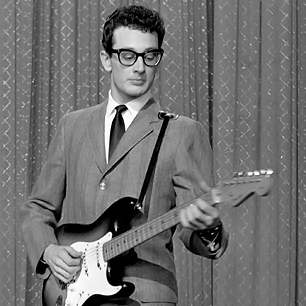You probably wouldn’t guess this from my constant prattle about Rick Springfield and all things 1980s, but I’m a big fan of rock and roll’s early period, i.e., the decade between the genre’s emergence in 1954 with “Rock Around the Clock” up until the Beatles arrived in America in ’64 and kicked off the British Invasion. In particular, I enjoy the music of the late, great Buddy Holly.
I think it’s a real shame that Holly is probably better remembered these days for his untimely death in a plane crash — which also took the lives of two other musicians, J.P. “The Big Bopper” Richardson and Ritchie Valens, along with their pilot, Roger Peterson — than for his music. There was so much more to him than his misfortune of becoming one of rock’s very first fallen heroes. In only a year and a half between 1957 and that fatal February day in 1959, Holly charted 12 singles (both as a solo act and with his band, the Crickets), and recorded many, many more, quite a few of which became posthumous classics. That’s an almost astounding level of output for such a short timeframe. In addition, he wrote much of his own material, which was very unusual for that period (Elvis, for example, never wrote any of his own stuff). And Holly was involved in producing his own music, too (another rarity for the ’50s), and was fooling around with ahead-of-their-time methods such as multi-track recording, which wouldn’t really attain fruition until The Beatles’ landmark Sgt. Pepper album. He was an impressive talent, and fans like me have long wondered where he might have gone had he lived beyond the tender age of 22.
So naturally I couldn’t resist the challenge posed by science-fiction writer David Gerrold on his Facebook page yesterday:
Assume you have access to alternate timelines. (The divergences begin anywhere after the mid fifties.) In those alternate timelines Heinlein wrote different books, the Beatles recorded different albums, Disney made different movies.
What are some of the titles of alternate Heinlein books, Beatles albums, and other great works you might find in alternate timelines? What if Buddy Holly had lived? What other artists’ albums or books or movies would you go looking for?
Emphasis mine, as that was the segment that caught my eye. Given my enthusiasm for Buddy, I couldn’t resist replying to that. Originally my intention was just to dash off one or two smart-alecky lines and call it good, but once I started in, the words really started rolling and, well, I ended up with something I’m kind of proud of… just for fun, here’s my alternate history of the life and career of Charles Hardin Holley (slightly revised from the off-the-cuff Facebook version):
After miraculously surviving the plane crash that killed several others, Buddy Holly largely disappeared from public view for an eight-year period of self-reflection, only to re-emerge for a brief on-stage appearance at the 1967 Monterey Pop Festival. Backed by the Rolling Stones (long-time fans of Buddy’s), he performed “Peggy Sue” and a new composition dedicated to his late friends, Ritchie Valens and JP Richardson.
Stunned by the overwhelmingly positive reception, he immediately set to work on an album of new material that was widely hailed as a masterful updating of his signature sound. Holly would become one of rock music’s most inventive artists, continually evolving and experimenting. His next project, a collaboration with Ray Charles and other black artists from the world of soul and gospel music, fulfilled his longtime dream of bridging the race gap through music.
Following that, his album of classic pop standards, “All of Me,” liberated him from the rock genre and enabled him to record pretty much anything he wanted.
In the 1970s, he enjoyed a successful run at the Las Vegas Hilton, as well as occasional appearances on television game shows and series such as “The Love Boat” and “Fantasy Island.” The arrival of MTV made Holly nervous — in his words, “Who’d want to look at an old guy in nerdy glasses like me?” — but he became something of a cult phenomenon in the network’s early days. Later in the ’80s, Holly recorded “The Travelin’ Wilburys, Vol 5” with his contemporary Roy Orbison and, with Bruce Springsteen and Willie Nelson, co-wrote a rock opera exploring the plight of the American farmer. His on-stage reunion with The Crickets at Live Aid was one of the highlights of that event.
By the 1990s, when most of his contemporaries were long since retired, Holly was still going strong, writing new music that would be recorded by acts as varied as Madonna, Hootie and the Blowfish, and Sting. As of this writing, Holly, Elvis Presley, and Jerry Lee Lewis are headlining one of the most lucrative concert tours of all time…
Wouldn’t that have been something?


